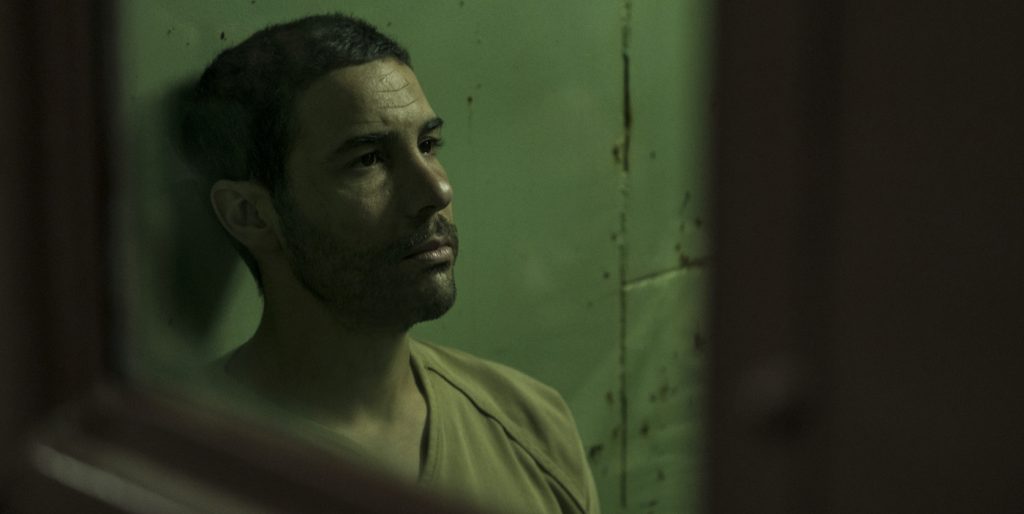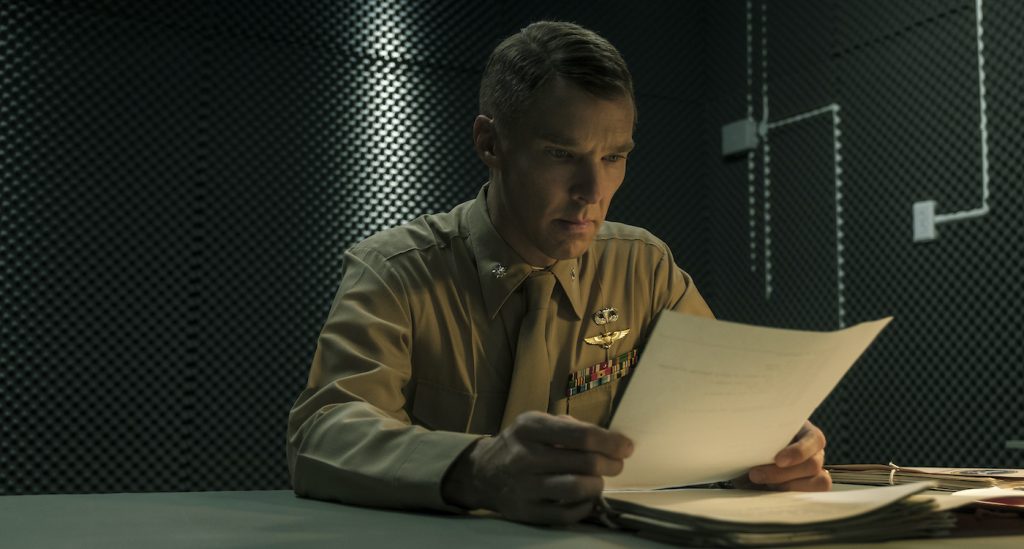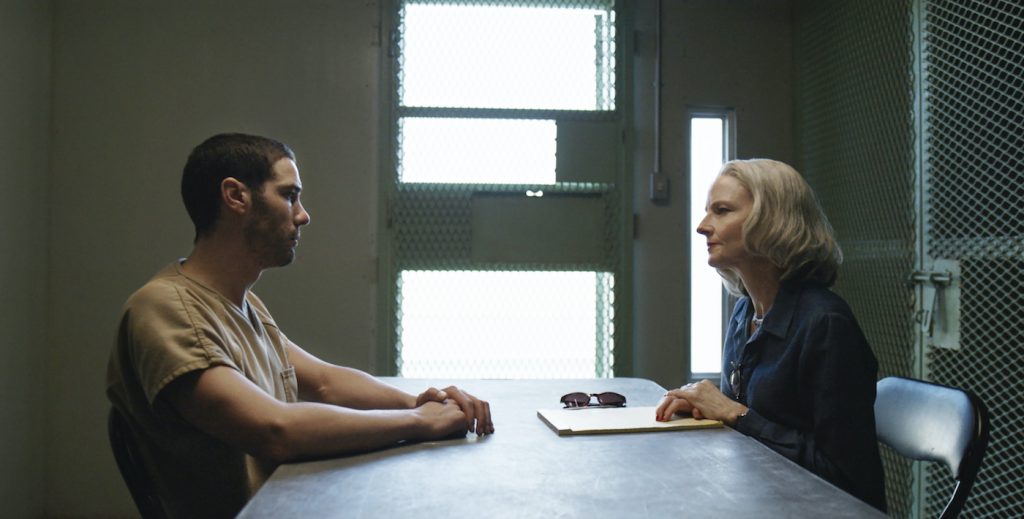Tahar Rahim on Playing With Brutal Truths in “The Mauritanian”
The Mauritanian boasts performances from Jodie Foster, a legend who has earned the right to be picky about her roles, Benedict Cumberbatch, and Shailene Woodley. All are predictably excellent—Foster as the dogged defense attorney Nancy Hollander, Cumberbatch as the military prosecutor Stuart Couch, and Woodley as Hollander’s tenacious assistant Teri Duncan. Yet director Kevin Macdonald’s film hinges on the performance of its’ titular Mauritanian, the French-Algerian actor Tahar Rahim, who plays Mohamedou Ould Slahi, a victim of America’s aggressive, punitive overreach in the months and years after 9/11. Slahi’s is eventually detained in Guantanamo Bay, Cuba—the location is now synonymous with shame—for fourteen years without a charge by the U.S. Government. While the details of Slahi’s life raised some legitimate questions for authorities, it’s ultimately evident there is no actual evidence outside a forced confession, elicited under torture. Like many others being held in Guantanamo, Slahi’s extended incarceration becomes a human rights abomination. Rahim is astonishing in the role.
The Mauritanian is based on Slahi’s memoir, “Guantanamo Diary.” Slahi was swept up in the wake of 9/11 while at a wedding in Mauritania in 2002, and he’s ostensibly linked to 9/11 in several ways, including by a call he received from Bin Laden’s satellite phone (picked up by German intelligence). This is more than enough for an American government with a rapacious appetite to imprison now and ask questions—brutally, through “enhanced interrogation”—later. Of course, “later” means indefinitely.
“I’ve portrayed real people before,” Rahim said via Zoom from his apartment in Paris, “like Ali Soufan in The Looming Tower, but this time was different because I felt even more responsible. I didn’t want Mohamedou to feel sad or diminished when he watched the movie. He was the first audience member I wanted to please. This time we’re talking about someone who has been through a horrible ordeal and is still not free.” Slahi is still living in limbo. Despite having been freed, at long last, from Guantanamo, Rahim calls his current situation “an open sky prison.” He cannot leave Mauritania, and that includes to visit his wife and son, who live in Berlin. “Each time he asks for an application to visit, they refuse. So the first time he had the chance to travel was to South Africa, to come on set.”

Rahim is no stranger to dark material. From The Looming Tower to his powerhouse performance in Jacques Audiard’s riveting 2009 drama A Prophet, his career has been a study in intensity. Yet the stakes for The Mauritanian felt elevated. Rahim was planning on easing into the role as filming got underway, but those hopes were dashed.
“Each time you shoot a movie, the schedule is made in such a way where you can start slowly, get into the role quietly so you can have a sense of the whole thing, and then you go for the hard things,” Rahim says. “This time, Jodie got sick, so the schedule changed. Kevin [Macdonald] called me two days before the start and said, ‘I’m sorry, we have to start with the last monologue.'” This meant Rahim would be starting with Slahi already a longtime ward of America’s experiment in para-jurisdictional limbo, at a moment where he’s finally able to make his case to a judge, a tough mental space to leap into. “So I’ve got to start as if I’ve spent six years in this jail, with everything he’s been through? Okay, how am I going to do it? But in reading the script, I realized Mohamedou was always trying to get to the courtroom. He was nervous, and I’m like, yeah, that’s exactly what’s happening with me. I’ve always wanted to be in this type of movie, and now that I’m here I’m scared to death. So I just used what I felt in the moment to give it to the audience.”
The Mauritanian doesn’t shy away from the darkest portions of Slahi’s experience in Guantanamo. It was under torture that he “confessed” to recruiting the hijackers who flew the planes into the World Trade Center. These confessions were totally bogus, which is essentially the case with all confessions made under torture. Slahi was trying to stop the pain, the humiliation, the endless anguish.
Getting into an approximation of Slahi’s headspace was the best Rahim could hope for. “It’s very complicated,” Rahim says. “How could I possibly rehearse torture? The only way I found was to get a feel for it was to get as close as possible to Mohamedou’s condition. I asked them to make the cells as cold as possible, to wear real shackles, to get waterboarded, and I lost a lot of weight in a short amount of time. But I knew in the back of my mind that once we wrapped, I’d go to my hotel room. It was not the case for Mohamedou. It would never stop. It’s a bit strange when you do this, it feels good in a way for an actor to suffer, because what you’re looking for, all the time, is to touch the truth. It’s not about performing, it’s about experiencing.”
Foster’s defense attorney Nancy Hollander took on Slahi’s case under another kind of duress. Defending suspected terrorists in the shadow of 9/11 meant absorbing scorn—at best—and grotesque accusations of every sort. Foster is, unsurprisingly, riveting as the dogged Hollander, yet Rahim thinks it’s Cumberbatch’s military prosecutor Stuart Couch who is arguably the film’s change agent. “I was pleasantly surprised to discover when I watched the movie that his part, the arc of his role, might be the most important one in the film,” Rahim says. “When the film starts, his character wants to put the needle in Mohamedou’s arm. But then he flips over the course of the movie, so in this identification process for a Western audience, he’s the most important character. His role carries something beyond the movie. We’re talking about universal values and the fact that we should not be guided or led by our fears. If this movie can help people with preconceptions start questioning themselves, that’ll be amazing.”

Rahim never got to work with Cumberbatch in person in The Mauritanian, but he and Foster were hand in glove. “It was an honor for me to work with her,” he says. “I grew up with her movies, and knowing I was going to work with her, I was like, okay man, I’ve got to be ready [laughs—rolls up his sleeves], like very ready, but she’s the coolest.” Rahim said he was initially intimidated, but the feeling faded as they got to work. “The way she behaved, who she is naturally, she relaxes you instantly. You have someone who plays with you, not against you. So we’re starting a dance. We didn’t talk that much between takes, we were very focused. But we could tell something was happening in the silences between the lines, between the takes. All you have to do, if you’re well prepared, is to follow.”

The art of acting, a multifaceted thing that’s hard to cleanly summarize, can at least be partially understood as the art of listening. The great actors aren’t just performing their roles, they’re engaged with their screen partners, moment by moment, and these performances then react to and shape each other. “Generosity is the DNA of acting,” Rahim says. “If you’re generous enough, you will always improve. You’ll always learn.”
Rahim is getting rave reviews for his performance, but he says the most important reaction he’s gotten was from a stranger on Instagram. He read it to me. “I was one of the people who hated anyone in connection with 9/11,” Rahim read off his phone. “I even ended a friendship because of being stubborn. You’re role actually had me in tears through your character’s horrific ordeal. I actually contacted my old friend and begged him to accept my apology. The sad part is I’m a minority from Cuba and seeing my beautiful homeland, and your character blocked from seeing it, broke my heart. I hope the real person you played accepts my apologies for my hate at the time.”
Rahim was beaming. “I was so moved when I read it, I was like, okay, that was meaningful. That’s the best reward you can get. We’re talking about peace and forgiveness!”
The Mauritanian is in select theaters and On Demand.



